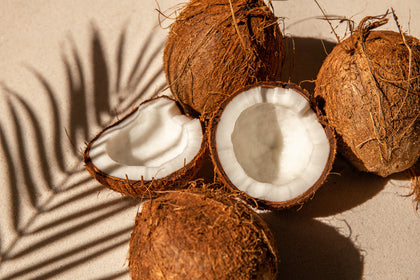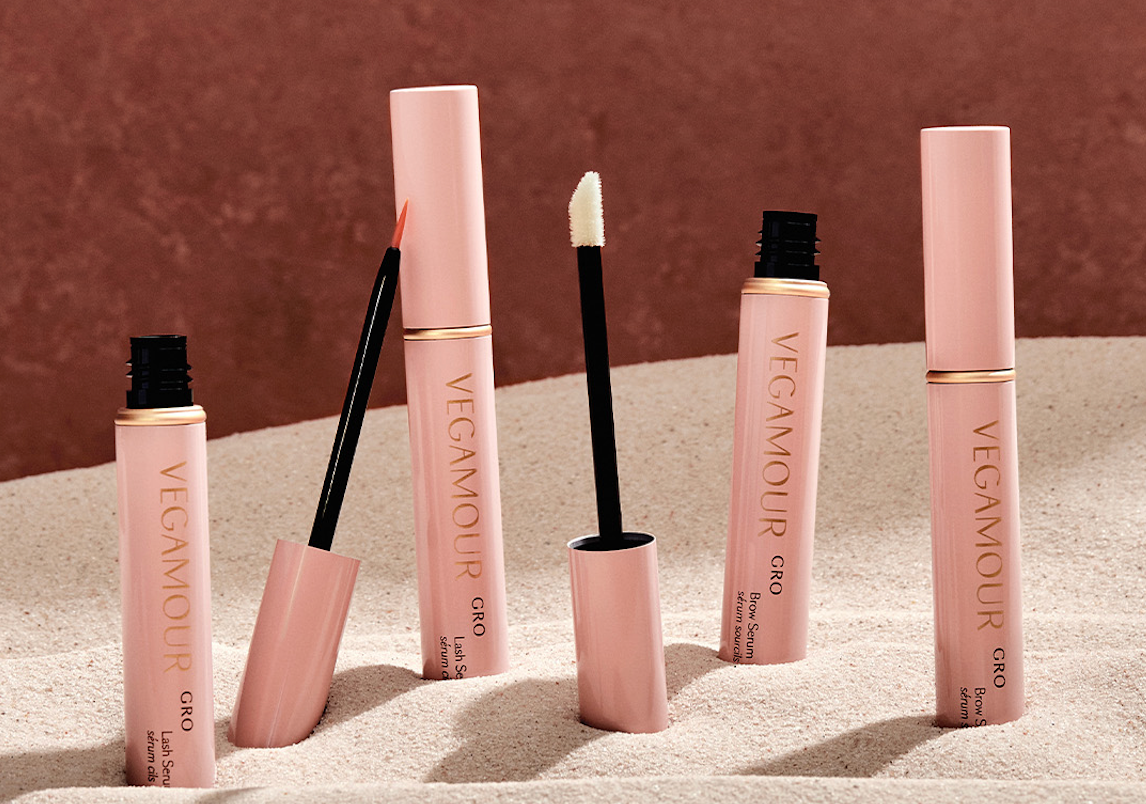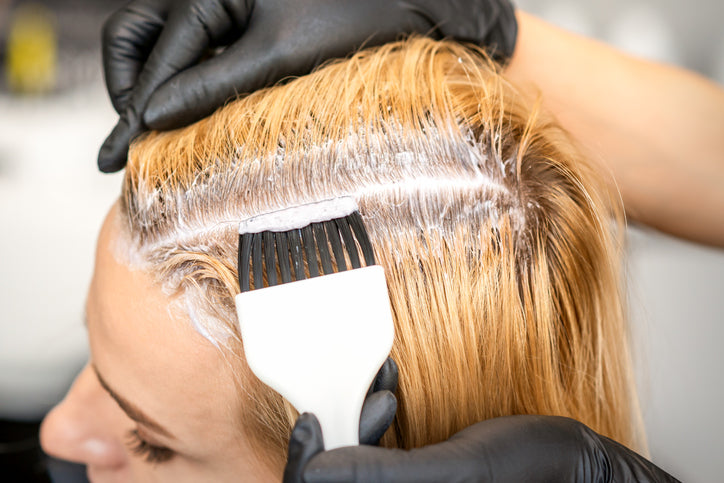Coconut oil is having a moment. Scroll or read through any nutritious recipe page, and you'll notice that regular olive oil has been replaced by coconut oil as a clean cooking staple. And while using coconut oil to moisturize and nourish dry skin is pretty standard, could coconut oil also be good for lashes?
To find out whether using coconut oil on your lashes is all it's cracked up to be, VEGAMOUR spoke to the experts and dug into the research. Plus, find out what vegan lash serum you should be using for thicker, fuller-looking lashes.
How Does Coconut Oil Help Hair?
Coconut oil comes from the milk and flesh of coconuts. Coconut and organic coconut oil have a thicker, meatier texture that's denser than many other oils. Rather than drizzling and pouring it onto the skin, it's often scooped out of a pot and then gently dispersed by rubbing it into the skin. Certified dermatologist Dr. Cory Gaskins broke it down, "Coconut oil has been used for centuries as a natural remedy to help with hair growth. The oil provides essential nutrients that are necessary for nourishing and healing hair."
But is coconut oil good for eyelashes, and if it is, how does it work? It's important to note that the studies that have taken place so far on the effectiveness of coconut oil on hair focus solely on hair strands on your head, but in theory, this information could also be applied to eyelash hair.
Shop: VEGAMOUR's Eyelash Enhancers
#include-related-slider#
Stronger, Longer Lashes
Evidence suggests that using coconut oil protects hair from daily wear and tear caused by washing and heat styling. According to research, the medium-chain fatty acids (capric, lauric and caprylic) in the oil appear to allow the coconut oil to sink into the hair shaft easily. Lauric acid is a fatty acid that absorbs quickly to promote hair cell growth. This action is potentially why coconut oil protects lashes more comprehensively when compared to other oils. And if the hair follicles have more protection, it's plausible that the coconut oil helps lash lines stay thick and luscious
Another study that looked at the effectiveness of using coconut, sunflower and mineral oil on hair damage found that applying coconut oil to hair before or after it is washed can help reduce protein loss. So, in the context of your lashes, coconut oil could help protect lashes when you're removing eye makeup.
Protection From Bacterial and Fungal Infections
Your eyelashes pick up dust and can retain old makeup easily. The microbial organisms on the upper and lower lashes can linger and cause irritating fungal and bacterial infections, leading to hair loss. The medium fatty acids (especially lauric acid) present in coconut oil have antifungal and antimicrobial properties that can offer skin protection.
Research also suggests applying coconut oil to the lashes and the skin around the top and bottom lashes can protect hair and guard against skin infections such as folliculitis, which is inflammation of the hair follicles. And if you wear mascara, the microbial bacteria found on the lashes could contaminate the wand if you use the same tube for more than three months. So, it's important to switch out your mascara regularly.
Thicker Lashes
Because the benefits of coconut oil include protecting and strengthening hair, it's assumed that consistent use could encourage fuller lashes and result in fewer eyelashes falling out. "Coconut oil helps protect the hair from damage, making it an ideal choice for those looking to improve their hair's health," said Gaskins. "In addition to helping with hair growth, coconut oil can also help improve the appearance of your eyelashes' appearance. The oil can help to nourish and strengthen lashes, giving them a fuller and healthier appearance."
Using coconut oil to encourage better-looking lashes is an option, but it can be tricky and a little messy. If you're looking for an all-natural and easy wasy to a fuller and thicker lash look, GRO Lash Serum comes with an easy-to-use applicator. This 100% vegan formula is made without hormones or carcinogens and contains powerful plant actives that have been clinically proven to get results in as little as 30 days.
How To Use Coconut Oil on Your Lashes
Whether you use organic virgin coconut oil or pure coconut oil, there are several ways to apply coconut oil to your lashes. A disposable eyelash brush or washed mascara wand will help the application smoothly.
Gaskins suggests the following method:
- Start with a clean face. Remove all makeup and gently wash your lashes with a mild cleanser.
- Apply a small amount of coconut oil to a cotton swab or your fingers and massage it into your lashes.
- Leave the oil on overnight and rinse it off in the morning.
- Repeat this process every night for best results.
If you're using a mascara wand:
- Dip the brush or wand into the oil.
- Wipe away excess oil.
- Apply the oil to the lower and upper lashes as you would mascara.
- Gently wipe away excess with a cotton swab or use your index finger with minimal pressure.
What Else Is Coconut Oil Used For?
Unlike other mineral oils, coconut oil is hugely versatile and could be a welcome addition to your well-being routine. You can also use coconut oil as:
- A source of energy. Medium-chain triglycerides (MCTs) are a type of saturated fat found in coconut oil that can energize the body in a similar way to carbs.
- A fat-burning aid. Those helpful MCTs may increase the number of calories burned, which could help promote weight loss in some cases.
- A way to reduce seizures. Keto diets and diets that are very low in carbs and high in fats have long been suggested as a way to treat seizure disorders. Some studies indicate that the MCTs in coconut oil add to this positive effect and act as a helpful aid.
- A way to improve skin health. Research suggests that coconut oil can help boost the moisture content of dry skin, giving it a smoother and softer appearance. Coconut oil may also protect the skin from chemicals, infectious agents and allergens.
- Hair protection. Hair cosmetics and constantly using hot tools can damage tender tresses long-term. Coconut oil can deeply penetrate strands and strengthen them so they won't break under tension.
Is Coconut Oil Safe?
A skin test is always good whether you try essential oils or coconut oil. First, apply the coconut oil to the inside of your wrist and wait for 24 hours for signs of a reaction. Coconut oil allergies are rare, but it's good to check, especially when applying something around the eyes. If you apply coconut oil and experience an uncomfortable sensation, remove it immediately with a cotton swab and wash the area thoroughly with warm water.
The Takeaway
If you're constantly putting stress and strain on your tender lashes with eyelash styling tools, lash extensions and layers of mascara, it might be time to treat them to a little TLC. Coconut oil offers an affordable way to tend to delicate lashes and could help improve their overall appearance. One of the kindest things you can do to support the wellness of your lashes long-term, however, is to create a routine that utilizes non-toxic and natural lash products that are packed with powerful phyto-actives and easy to apply. Adding products made with only clinically proven vegan ingredients into your routine will help keep lashes long and fluttery for years to come.
#include-related-slider#
More From VEGAMOUR
- GRO Lash Serum Gave Me Lashes I Love
- How to Grow (or Regrow) Your Eyelashes
- Top 5 Reasons to Subscribe to Your Favorite VEGAMOUR Products
Photo credit: Melanie Maya/iStock
Back




















